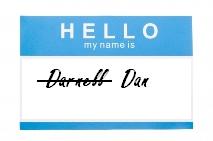
After generations of Georges, Williams, Johns, and Jameses, we now have a Barack in the White House. So we can all agree that name discrimination is history. Yeah, right! Tell that to the woman who wrote this post on Tuesday, describing her experience as a highly qualified job candidate who couldn't get an interview until she began using her middle name (Danielle) instead of her first name (Danisha) on her resume.
Name discrimination is a discouraging fact, but hardly a surprise. It's just one of the many biases that can affect the hiring process. Several years ago (2003), Kendra Hamilton reported on a study in which researchers from the University of Chicago and MIT sent out 5,000 resumes with either white-sounding or black-sounding names chosen from birth records. Bottom line, they found that resumes with names like Jay, Brad, Carrie, and Kristen were 50 percent more likely to receive a callback than those with names like Keisha, Latoya, Rasheed, and Darnell.
OK, that's one shocking statistic, which at first glance might seem to imply that recruiters, HR people, and hiring managers must be a bunch of filthy racists. (Tabloid journalism, anyone?) Come on. A tiny percentage may be, but overall, hiring professionals were anxious to learn how to remove these biases from the screening process once they learned of them, according to the researchers.
Suffice it to say, every human being has biases. We can reject the ones we're aware of in ourselves, but it's tough to act on the ones that are subconscious.
But sometimes name discrimination isn't about race or ethnicity or xenophobia at all. It's just laziness or fear of embarrassment. If the name on your resume looks hard to pronounce and/or isn't gender-specific, it's quite plausible that a hiring manager might (consciously or not) reject it for that reason, alone.
Let's say, for example, you're a recruiter trying to cull a stack of 100 resumes down to 10. You see one from an applicant named Taidgh Smith. Unless you're familiar with traditional Irish names, you probably would wonder if Taidgh is a man or a woman, and how his/her name is pronounced. Tage? Taddig? (Nope, not even close.)
What do you think most recruiters would do in that situation? Would they take the time to Google the name to find out its origins? Human nature being what it is, most people will take the quicker, easier route and just skip over the difficult resume.
[BTW, I have a nephew named Taidgh, so let me say for the record that it's a boy's name, and it's pronounced roughly like "Tiger" without the r.]
If you were a job seeker facing possible name discrimination, would you switch to a more commonly known middle name, or a nickname that sounds more white or Anglo? Maybe use only your initials, or otherwise change the name on your resume? Or, would you stick with your real name, regardless? (We're talking first names—you can't really mess with your surname.)
[poll:9]
RELATED LINKS
Put Your Brand Name on Your Resume, Not Your Real Name
When Bad HR Happens to Good Job Seekers
Check Your Resume Before You Send It
Ready To Jump Start Your Job Search?
